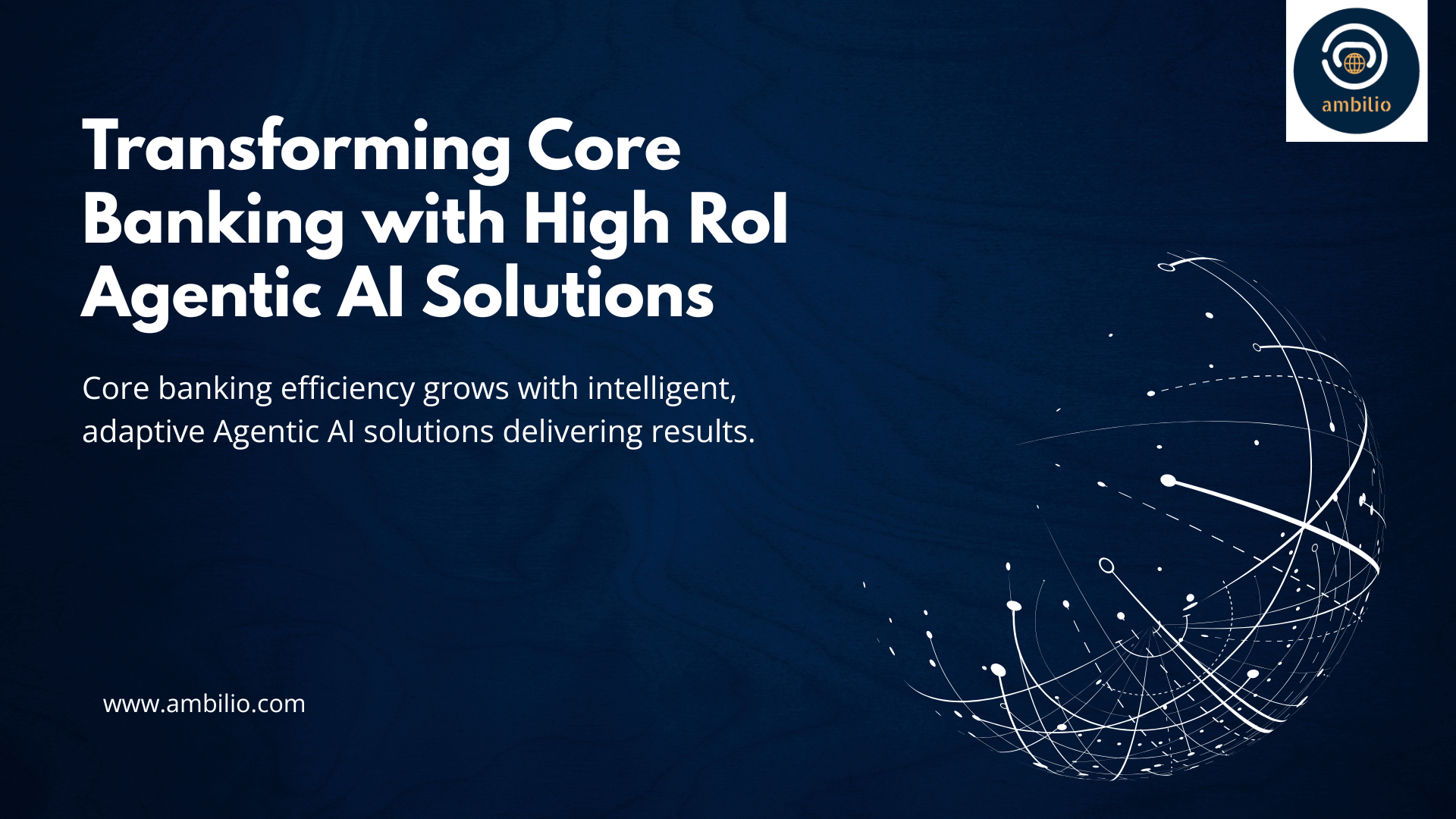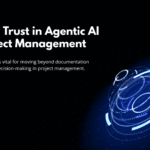The banking industry is undergoing a massive transformation driven by artificial intelligence. Traditional automation tools have already helped reduce costs and improve efficiency, but the real game changer is the rise of Agentic AI solutions. These solutions go beyond simple automation by introducing autonomous, reasoning-driven agents that can act, decide, and manage workflows with minimal human intervention. In this article, we will explore how Agentic AI solutions in core banking functions are delivering high return on investment (RoI). We will look at practical use cases, understand their benefits, and examine how they are reshaping customer experience, compliance, risk management, and overall business growth.
Understanding Agentic AI in Banking
Agentic AI refers to systems that can operate as intelligent agents, capable of reasoning, analyzing multiple data points, interacting with other systems, and even taking action based on defined goals. Unlike rule-based bots, these agents learn from past interactions and adapt to changing conditions. For core banking functions, this ability is crucial because processes such as customer onboarding, credit decisions, fraud detection, and compliance require handling large volumes of data while ensuring accuracy and speed. By deploying Agentic AI solutions in core banking, banks are moving from reactive operations to proactive, self-optimizing workflows.
Customer Onboarding and KYC
One of the most time-consuming processes in banking is customer onboarding and Know Your Customer (KYC) checks. Traditionally, customers submit multiple documents, which are verified manually against databases and compliance rules. This often results in delays and customer frustration. An AI agent can transform this by collecting documents digitally, applying optical character recognition to read them, checking against regulatory databases, and even flagging suspicious cases automatically. The onboarding time is reduced from days to minutes, and compliance accuracy improves significantly. This not only enhances customer satisfaction but also reduces manpower costs, creating strong financial returns for the bank.
Credit Underwriting and Loan Processing
Credit decision-making is at the heart of banking profitability. Underwriting involves assessing a customer’s financial history, income stability, and creditworthiness. Current processes rely on manual analysis of credit bureau reports and financial statements, which can take days. With Agentic AI, banks can create agents that gather data from multiple sources, analyze risk patterns, run simulations, and generate recommendations almost instantly. These agents are not limited to traditional credit scores; they can also analyze behavioral data such as spending habits and digital footprints. By making faster and more accurate loan decisions, banks can expand their lending portfolios, minimize defaults, and improve interest margins.
Fraud Detection and Prevention
Fraud continues to be one of the biggest risks in banking. From card fraud to synthetic identities, threats are evolving rapidly. Most fraud monitoring systems generate large numbers of alerts, many of which turn out to be false positives, overloading human investigators. Agentic AI solutions in core banking provide a better way by analyzing transaction behavior in real time, cross-referencing with customer patterns, and automatically acting on suspicious activity. For example, an agent can block a transaction, alert the customer through a secure channel, and escalate only genuine high-risk cases to human teams. This reduces fraud losses, improves customer trust, and lowers the cost of investigations.
Personalized Financial Advisory
Banks have long struggled to deliver personalized advisory at scale. Relationship managers often focus only on high-value clients, while most retail customers receive generic offers. Agentic AI can fill this gap by analyzing each customer’s account history, investment portfolio, goals, and even life events. The agent can then suggest customized saving strategies, loan restructuring plans, tax-saving investments, or cross-sell products suited to individual needs. Customers receive 24/7 assistance through chat or voice interfaces, while complex cases can be escalated to human advisors. This hybrid model increases customer engagement, drives revenue through cross-selling, and builds long-term loyalty.
Treasury and Liquidity Management
Managing liquidity and forecasting cash flows are critical for a bank’s stability. Treasury teams typically handle this manually, reviewing inflows, outflows, and balance sheets across multiple systems. With Agentic AI, an agent can continuously monitor real-time data, forecast liquidity requirements, and even recommend hedging strategies against risks such as currency fluctuations. These agents can autonomously execute low-risk trades within defined limits, ensuring cash reserves are optimized and risks are reduced. The outcome is better capital utilization, lower borrowing costs, and higher profitability.
Compliance and Regulatory Reporting
Regulatory compliance is one of the most resource-intensive aspects of banking. From anti-money laundering checks to data protection laws, banks spend millions each year on reporting and audits. An AI agent can simplify this by constantly monitoring transactions, compiling required data, and generating compliance reports in the correct formats for regulators. These agents can also keep track of new regulatory guidelines and suggest required process updates. This not only reduces compliance costs but also minimizes the risk of penalties for non-compliance, providing a strong RoI for banks.
Debt Collections and Recovery
Debt collection is often a stressful process for both banks and customers. Traditional methods involve repeated calls, letters, or legal action, which are costly and sometimes ineffective. Agentic AI solutions in core banking improve this area by segmenting customers based on repayment likelihood and engaging them with personalized repayment plans. An agent can send reminders through digital channels, negotiate repayment terms, and escalate only high-risk cases to legal teams. This increases recovery rates, reduces the cost of collections, and helps maintain better customer relationships even during financial stress.
Back-office Operations and Reconciliations
Core banking operations such as reconciliation, settlement, and exception handling consume significant time and manpower. These processes involve matching transactions across multiple systems and resolving mismatches. An AI agent can perform these tasks autonomously by pulling data from different systems, identifying mismatches, and applying corrections based on historical patterns. Over time, the agent improves its accuracy and requires less human oversight. The result is faster reconciliations, fewer errors, and a significant reduction in back-office operational costs.
Cybersecurity and Threat Response
In an increasingly digital banking environment, cybersecurity is a major priority. Security teams face thousands of alerts daily from monitoring tools, many of which are false alarms. An AI agent can act as a first responder by analyzing patterns, isolating compromised accounts, or blocking suspicious devices. It can also recommend remediation actions and coordinate with IT systems for faster patching. This proactive defense mechanism reduces the mean time to resolution, minimizes exposure to cyber threats, and helps banks avoid both financial and reputational losses.
Final Words
Agentic AI solutions in core banking are not just an incremental improvement but a transformative step for the industry. From speeding up customer onboarding to automating compliance and enhancing fraud prevention, these intelligent agents are driving measurable results in efficiency, cost savings, and customer experience. The high RoI from these solutions comes from their ability to work autonomously, reduce manual workloads, and deliver faster, smarter decisions. As banks continue to adopt digital-first strategies, the integration of Agentic AI will play a central role in defining competitive advantage and long-term sustainability in a rapidly evolving financial ecosystem.



